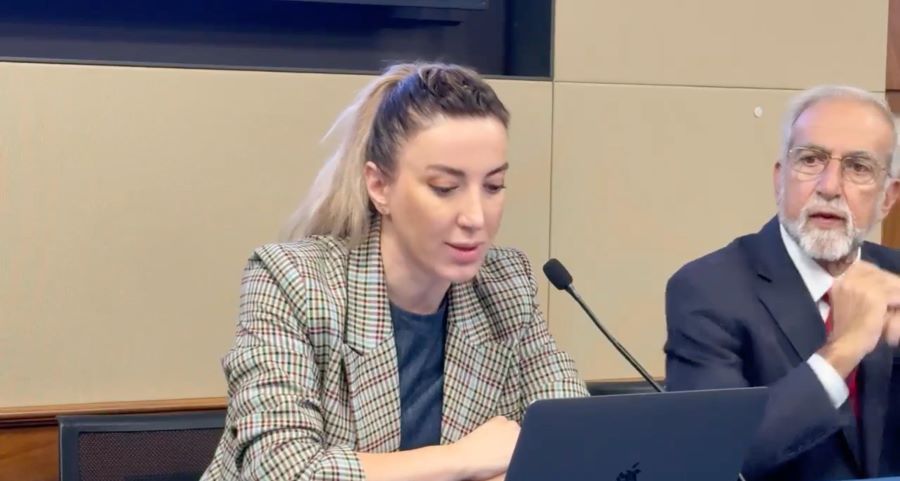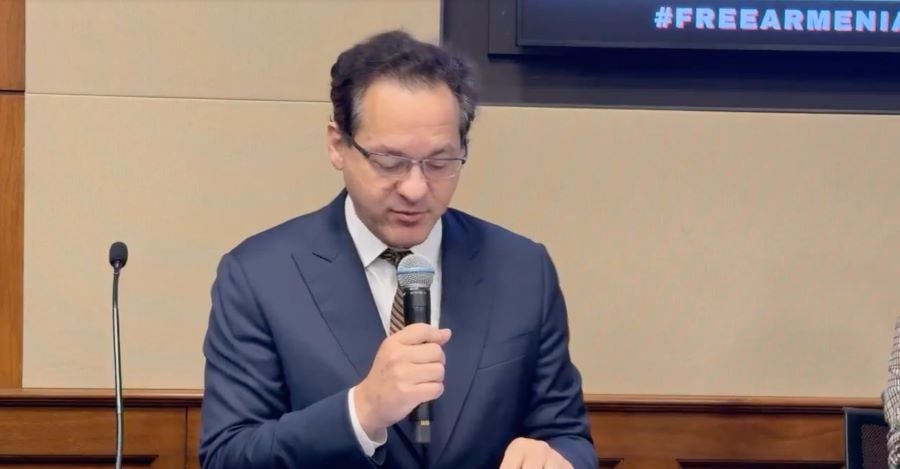Washington, D.C. — On September 17, a hearing titled “Justice for Armenian Prisoners” was held at the U.S. Capitol. The event was organized jointly by the Armenian National Committee of America (ANCA) and the Armenian Legal Center for Justice and Human Rights (ALCJHR) to raise awareness among Congressional staff about the plight of Armenian captives held in Baku.
The discussion was moderated by Ken Hachikian, chair of ALCJHR. Speakers included Siranush Sahakyan, attorney and president of the President of the International Comparative Law Center, legal representative for Armenian POWs at the European Court of Human Rights, and executive director of ALCJHR; Jared Genser, managing director of Perseus Strategies and international legal advisor to Ruben Vardanyan; and Karnig Kerkonian, Armenian-American attorney and founding partner at Kerkonian Dajani LLP.
Hachikian noted that the primary focus of the hearing was the 23 Armenian captives currently held in Baku, who are being subjected to torture and ill-treatment.
Attorney Sahakyan provided an overview of the general situation concerning Armenian captives, expressing particular concern over the suspension of activities of the International Committee of the Red Cross (ICRC) in Azerbaijan since September at the request of the Azerbaijani government. She emphasized that the ICRC was the only international body with access to Armenian prisoners of war and political detainees, and now the organization is deprived of this sole international mechanism. Since the ICRC’s last visit in June, no reliable information has been available regarding their condition.
Read also

Genser, who serves as international legal counsel to Ruben Vardanyan, outlined the numerous violations of rights that occurred during Vardanyan’s pretrial detention and ongoing trial. He noted that Vardanyan has gone on hunger strike twice, and during the first, was subjected to torture.
“Vardanyan now faces life in prison if convicted by the Baku Military Court on more than 40 fabricated charges, which include planning and waging a war of aggression, violating the laws and customs of war, smuggling, and financing terroism,” said Genser.
He described the charges as absurd, giving a specific example: “Ruben co-founded and serves on the Board of Directors of the Aurora Humanitarian Initiative, an NGO that is audited independently and helps those in need around the world. Yet, Azerbaijan has asserted that this NGO has been a vehicle for Ruben to finance terrorism.”
Speaking about the broader legal violations, Genser stated that numerous alleged “victims” were brought in to testify at the hearings, but all confirmed they had never seen Vardanyan and only knew about him through the media. “No factual evidence, literally none, has been presented to link Vardanyan to any of the incidents described,” he explained. “Yet all of this so-called evidence would be thrown out of any court, in which the rule of law prevails, as inadmissible hearsay, but not, of course, before Azerbaijan’s secret military tribunal.”
In response to a question from Hachikian regarding the more proactive stance of the Trump administration on the issue of Armenian captives, Genser emphasized the importance of the issue being raised during the Trump-Pashinyan meeting: “Now that a public commitment has been made, it’s crucial to ensure that the commitment is followed through. I don’t believe that Aliyev will want to release them all. I have already warned the Trump administration about this. It is essential that all of them are released.”
At the same time, while acknowledging that there is still a long way to go, Genser noted that communications from the White House and State Department have been consistent and coordinated, signaling a willingness to move forward. “Whether they are prepared to exert the pressure necessary to resolve the issue swiftly is a different question. And that’s exactly what we need to work on,” he said.
Free Armenian Prisoners
























































